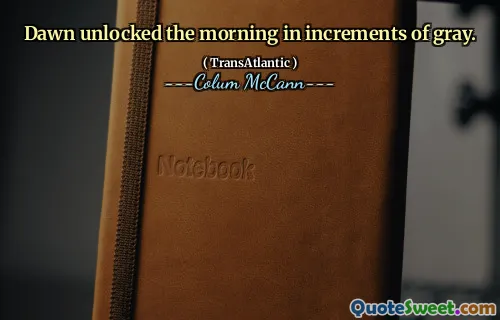"TransAtlantic" by Colum McCann intricately weaves together narrative threads from various historical moments, connecting events across the Atlantic Ocean. The novel presents a tapestry of stories that involve influential figures, such as Frederick Douglass, a former slave who travels to Ireland, and the pioneering aviators who cross the ocean. McCann effectively explores themes of connection, displacement, and the impact of history on personal lives through these interlinked narratives.
The structure of the book alternates between different time periods, allowing readers to see how the past informs the present. Douglass's visit to Ireland not only highlights his influence on the fight for freedom but also underscores the interconnectedness of various social justice movements. Each chapter introduces new characters and timelines, maintaining a sense of continuity while showcasing the diversity of experiences across cultures.
Through lyrical prose, McCann captures the essence of human resilience and the deep ties that bind individuals across distances. "TransAtlantic" ultimately invites readers to reflect on the legacies of history and the ways in which they shape contemporary identity, illustrating that journeys—both physical and metaphorical—are fundamental to the human experience.
More »
Today Birthdays
1729 -
Edmund Burke
1949 -
Haruki Murakami
1954 -
Howard Stern
1876 -
Jack London
1993 -
Zayn Malik
1951 -
Kirstie Alley
1863 -
Swami Vivekananda
1923 -
Alice Miller
1987 -
Naya Rivera
1825 -
Brooke Foss Westcott
1944 -
Joe Frazier
1951 -
Rush Limbaugh
1964 -
Jeff Bezos
1978 -
Jeremy Camp
1628 -
Charles Perrault
1856 -
John Singer Sargent
1970 -
Kaja Foglio
1953 -
Rick Santelli
1986 -
Gemma Arterton
1968 -
Raf Simons
1958 -
Christiane Amanpour
1966 -
Olivier Martinez
1996 -
Ella Henderson
1917 -
Maharishi Mahesh Yogi
1949 -
Ottmar Hitzfeld
1928 -
Ruth Brown
1968 -
Heather Mills
1946 -
George Duke
1968 -
Rachael Harris
1923 -
Ira Hayes

